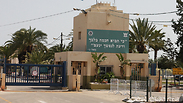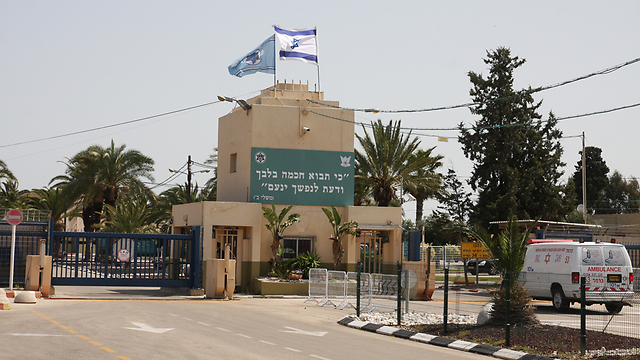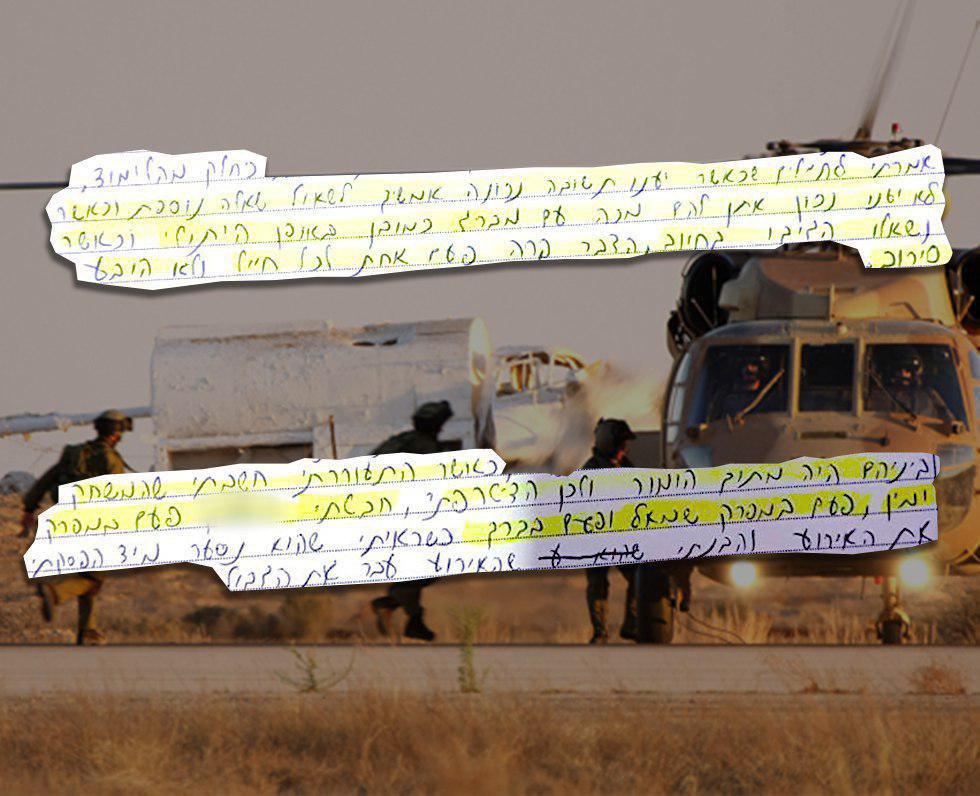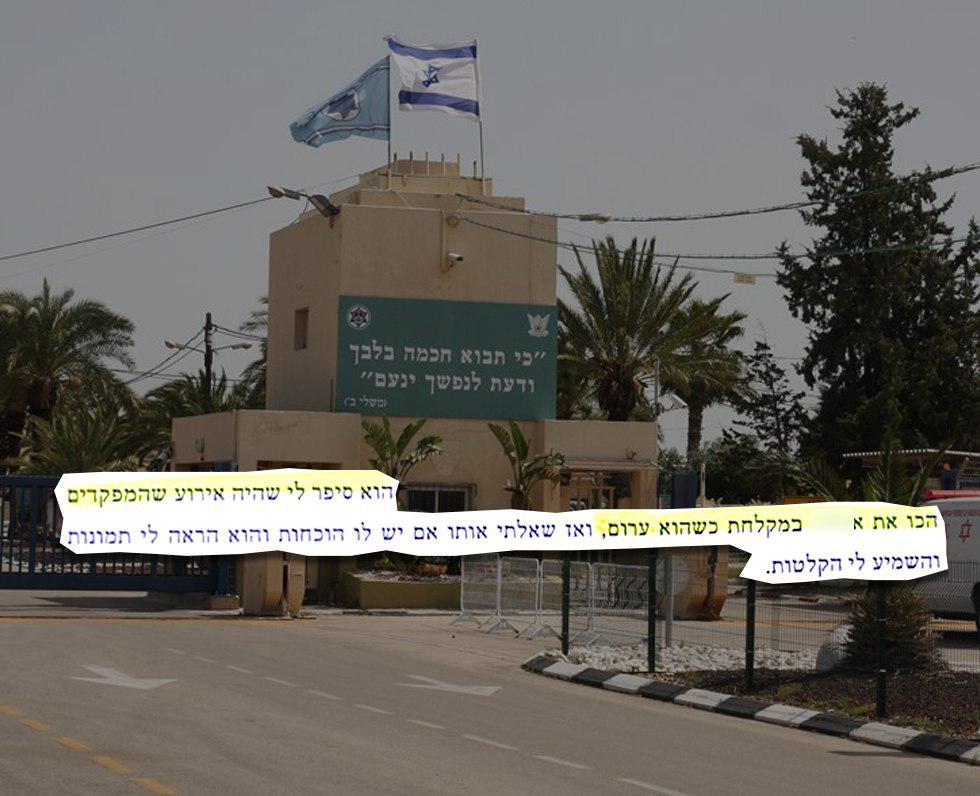Less than a week after an IDF commander identified only as Sgt. R signed a lenient plea deal and sentenced to 60 days in prison for physically abusing his subordinates, Ynet has obtained more disturbing testimonies about a series of violent incidents at an IAF course.
The case was first reported by Ynet a year ago, following the hospitalization of a trainee enrolled in a vocational course at the school.
The soldier claimed his commander, Sgt. R., began humiliating and physically abusing him and other soldiers several months after their enlistment. The abuse pattern at the school was revealed when Sgt. A., a cadet, arrived at the hospital with multiple wounds on his body.
Another commander is currently undergoing legal proceedings, and an IDF investigation has been opened into the conduct of a deputy training officer.
The chief judge of the Jaffa military court, Lt. Col. Carmel Wahabi, chose to approve the lenient plea deal despite the quantity of evidence against Sgt. R.
Although the judge described Sgt. R.'s actions as "abominable and severe," he agreed to a lenient punishment that also included his demotion to the rank of private, a compensation order of NIS 1,500, and 30 days of work normally carried out by a master sergeant.
Now, more testimonies about alleged abuses are surfacing, including the testimony of one victim—identified as Sergeant A.—who reported the incidents, which started back in 2014.
The IAF rejected the chagre that a pattern of abuse had permeated the school, instead describing these events as a isolated incidents. However, the rejection did not dovetail with the testimonies collected by the Military Police Criminal Investigations Division (MPCID).
The army claims that training and enforcement measures were taken in order to prevent similar incidents. In practice, however, no concrete steps were taken, and those involved were not reprimanded. Only two of the commanders involved have paid the price so far.
'Put your hands on the wall and take the blows like a man'
"I went to the commanders' room after I realized that my commander took my phone and told me that if I wanted it back, I had to go to his room," said Sargent A.
The abuse started 11 months ago when, Sargent A., a soldier at the Hatzerim Air Force Base near Be'er Sheva, was sent to the Air Force Technical School in Haifa for training.
"I went to the officers' room and Sergeant R. was already waiting for me a mop stick in his hands," he told the MPCID investigators.
"The second commander, Sergeant Z, was sleeping on the bed. Sergeant R. told me to put my hands on the wall and take the blows like a man. I looked him in the eye and told him I would not put my hands on the wall and he would not injure my back," Sgt. A. said in his testimony.
"He started to hit me with the mop. He had rage in his eyes. He hit me with a stick between 50 and 70 times. I tried to get away and told him, 'Stop, leave me alone, you are going too far.' I was in pain and I cried. I showed him that I was bleeding and he continued. He said that everything would be over if I put my hands on the wall and let him break the mop's stick on my back," he recalled.
At this point Sergeant Z. woke up. "When Z. woke up, he took the small part of the stick, which was broken in half by now, and began hitting me as well. Sergeant R. hit me on my legs and on the sides of my body, and Sergeant Z focused on the hands," the abused soldier said, adding that the level of pain was 15 on a scale of one to ten.
"I cannot even begin to describe the pain, they both had an evil look in their eyes. They were not kidding around. I had cuts and scratches from the broken stick. I shouted in pain, I cried, I was sweating and bleeding. My left hand was swollen because of the blows, and as soon as I showed them my hand, they stopped and I was done. I was dizzy. I felt humiliated and depressed," Sergeant A. added as he continued to describe his ordeal.
It was not the first time Sergeant A. had encountered this type of behavior. In his testimony, which was used in the indictment filed by the Military Advocate General Office, Sergeant A. describes first witnesseing the abuse carried out against others.
"When it started, I was in shock. I was quite frozen because I felt pressured by the whole thing. When Sergeant R. hit one of the trainees, I looked away. When it was the turn of the trainee standing next to me, I was scared because I knew I was next. I took a step back, and then Sergeant R. told me that if I did not take the blows now, then it would be worse later on."
Before the incident, Sargent A. was considered a good soldier. He received a positive appraisal, was highly motivated, demonstrated impressive personal skills, and was a perfect candidate for a command position.
Army investigators asked him why he waited for three weeks before filing a complaint, to which he replied: "I did not speak about it sooner because I was afraid that if I tell someone they would beat me, and it would ruin my chances of becoming a commander. Sergeant R. threatened me at the hospital that if I tell someone, I will get more beatings. He followed me around everywhere and made sure that I kept quiet."
The abused soldier also mentioned that the culprit had told him that he too had experienced worse treatment, such as fire using a deodorant spray, and being hit on his back with sticks.
Another commander hoping to ensure that the abuse ramained under wraps, attempted to maniputlate the victim into keeping quiet.
"Later on, on the way to the clinic, another commander said to me: 'You're going to be a commander. You do not seem like a snitch. I trust you.' I do not want this practice to go on, and for people to be subjected to this physical and mental pain. Sergeant R. went over the story, word by word, (the cover-up story that the commanders invented, according to which he fell down the stairs) all the way to the clinic," Sargent A. continued.
He also testified that he saw his abusive commander, Sergeant R, being hit by a senior commander: "I said, under pressure, that Sergeant R, was my 'senior', so the other commanders took us out of the room, and we knew that he was going to get some beating. We heard screams coming from the outside, we only caught a glimpse of him heading towards the wall and putting his hands up, he seemed to know the procedure and he had no problem with it. There was a cadet there who wanted to hit him with the stick, but he refused, claiming he would not take any beating from him."
The cover-up
The culture of accepted abuse was reflected in other testimonies as well. Corporal Y., a trainee in the school, testified: "Sergeant R. came into the room and asked the cadets 'Who is a man?' to which I replied 'I am, break the stick on my back'. At first everyone was scared of him, so he took me up on my offer and beat me with the stick in the garage. When I did not have the correct answer during training, I knew that I would get a blow with a screwdriver, as a joke. I wanted to be a 'man', so I told Sergeant R. to break a board on my back, and he agreed. When it was over, we smiled at each other and returned to the garage as friends."
According to Sergeant A., trainees were beaten with screwdriver handles dozens of times as part of the training process, while Sergeant Z. admitted to hitting cadets with a screwdriver
"I told the soldiers that when they gave the wrong answer, I would ask another question and if they did not answer correctly a second time, I would hit them with a screwdriver. Of course this was done jokingly. This only happened once to each soldier, and no one refused," Sgt. Z. said.
Sergeant R., the main defendant, tried to cover-up the events and claimed that the plaintiff sustained his injuries after falling down the stairs.
Only towards the end of his trial did he retract his denial and plead guilty as part of the lenient plea bargain. Sergeant R. even distributed an email around the school claiming that Sergeant A. fell.
During the course of the interrogation, however, MPCID investigators discovered telephone conversations between the parties involved, that expose the cover-up attempt.
One conversation between Sergeant A. and Sergeant Z. suggests that the abuse at the school is not a new occurrence.
Sergeant Z. advised the young cadet to cover his bruises, saying "If you manage to hide it then good, if not—think of another way. I came home bruised a million times and nothing happened. I simply covered up the bruises," said the victim.
Sergeant A.: "Really? But you're a sergeant."
Sergeant Z.: "I was also once a corporal, you know."
Sergeant A.: "What do you say?"
Sergeant Z.: "Not everyone is born a sergeant".
Sergeant A.: "How long has this been going on?"
Sergeant Z: "It's not a tradition, it' s fun, it's not a bad thing, if you take it badly, then I don' t want you to keep at it. Did you take it badly?"
Sergeant A.: "Oh, I'll tell you the truth, I think it was a bit extreme, but ah..."
Sergeant Z.: "You're right, I don't know what happened before I woke up."
Sergeant A.: "Even after you woke up it crossed the line."
Sergeant Z.: I also think it crossed the line. You need to know when to stop ... You do not have to be a victim ... It was not supposed to hurt you ... If it did ... I really am sorry. "
Another phone conversation between the two revealed that Sergeant Z. asked the cadet what he told his parents: "What did you say to your parents? Think about it before you get into trouble."
'I beat him with my weak arm'
During the course of the investigation, apart from Sergeant R., who was convicted in a plea bargain, six other commanders, including a lieutenant, were suspected of committing violent offenses against cadets. The proceedings in their case have not yet concluded.
In another phone conversation between Sergeant R. and Sergeant Z., the only two commanders charged so far, the parties can be heard discussing ways to cover-up the incident, indicating a concerted effort to conceal the abuse. "I'm afraid that A. will talk ... I'm really afraid, man," said Sergeant R., to which Sergeant Z. replied: "He no longer has any evidence."
As for the violent incidents Sargent, R. told investigators his version of the events: "As with men, we learn through power games and machismo, we arm wrestle, lightly push each other. It happened in the cadets' room, and everything was done jokingly, in a positive and good atmosphere, with their consent. We made it clear to them that if we cross a line, the should say something, and it will stop," he said.
Regarding the incident in which he beat the soldier with a stick, Sargent R. said: "We hit him gently with the pieces of the mop stick, and told him that if it was too much, he should say something. I gave him soft blows, with my weak left hand, after 10 minutes of gentle beatings. Another soldier hit me." Sargent A. denied these claims.
In his testimony, Sergeant R. said that he was also beaten by his commanders in the past. "It's something that happens from time to time ... Everything is done in good humor," he said.
The Military Advocate General's Office thought otherwise, and described in Sergeant R.'s indictment, among other things, a case in which a trainee refused to accept the beatings. In order to "calm down" his subordinates, the defendant said: "The expectation of a blow is more difficult than the blow itself."
Air force reject claims
Senior Air Force officers insist that abuse is not a common practice on bases, despite the fact that officers from the Air Force Technical School testified to the contrary.
Major Amnon Shlomov, for instance, who is a senior training officer at the base, testified that the incident was not a singular occurrence: "Sergeant A. told me that the commanders beat a soldier in the shower, while he was completely naked. I have recordings."
The IDF Spokesperson's Unit also responded to the cases, concluding that the evidence did not support the contention that abuse was a frequent occurrence on the bases. "The MPCID investigation into the matter did not indicate that there is a culture of violence at the base," a statement said.
Other military sources added: "Some of the soldiers who testified said that they heard of violent incidents that occurred a few years ago. Those soldiers could not provide any details, and some did not even serve in the unit while these incidents took place. Some soldiers reported hearing that following the commanding echelon's involvement, a change occurred, and the violence stopped. "
The IAF also noted that the base commander initiated the Military Police investigation.




















